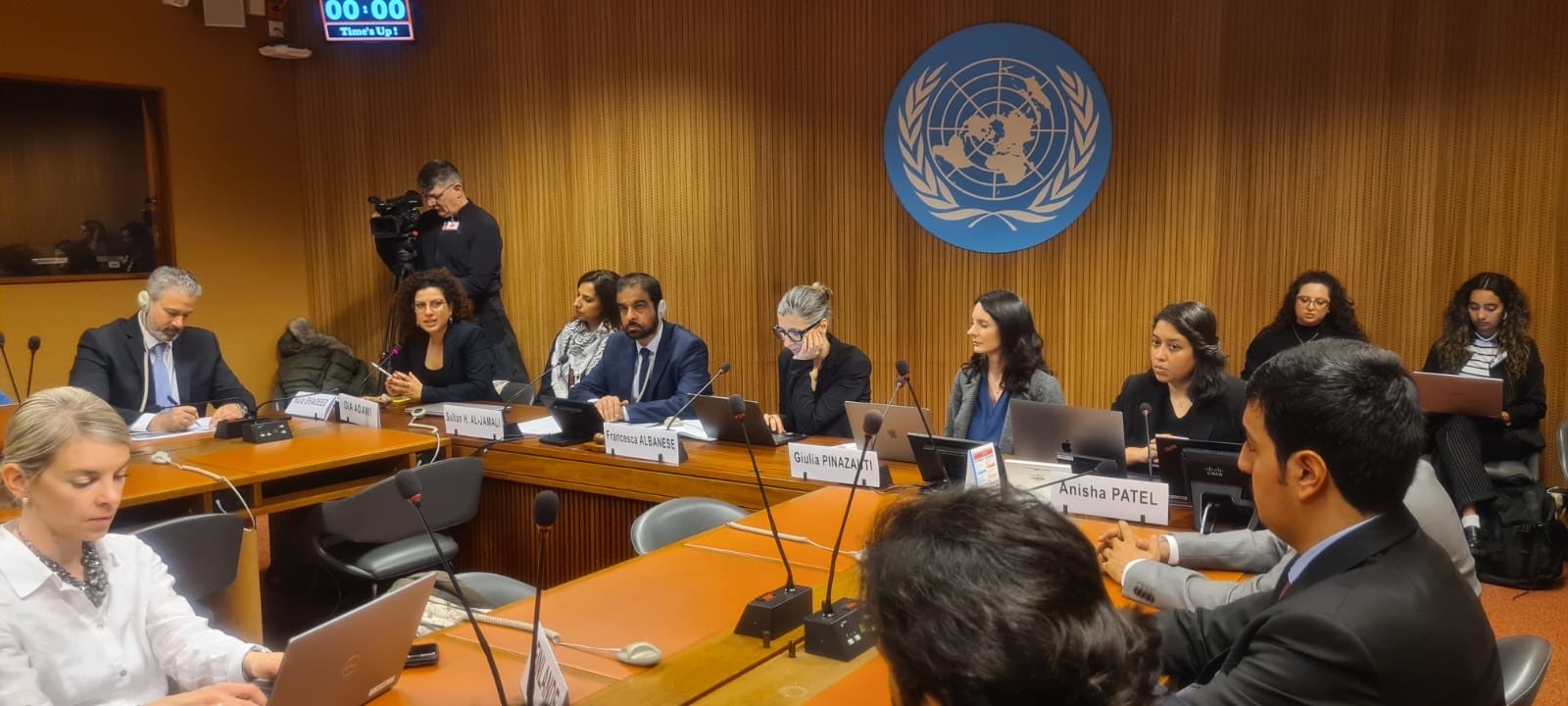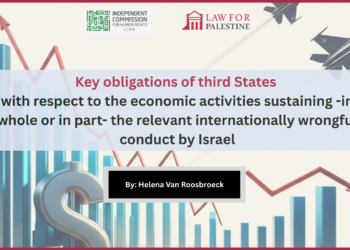Addressing Genocide Prevention: Law for Palestine Co-Hosts Human Rights Council Side Event on Third States’ Responsibility in Gaza
Law for Palestine, in collaboration with the Independent Commission for Human Rights – Palestine (ICHR), Human Rights Watch (HRW), and the Arab Network for National Human Rights Institutions (ANNHRI), hosted a side event during the 55th Session of the Human Rights Council. The event, titled “Third States’ Responsibility in Implementing ICJ Measures to Prevent Genocide in Gaza,” was attended by 26 United Nations delegations, including representatives from Algeria, Austria, Belgium, Costa Rica, Croatia, the European Union (EU), Finland, Gambia, Greece, Iceland, Iraq, Ireland, Jordan, Libya, Liechtenstein, Luxembourg, Malaysia, Montenegro, Morocco, Palestine, Poland, Qatar, Spain, Switzerland, Turkey, and the United Kingdom. The event was also live-streamed, reaching an audience of over 1100 viewers worldwide.
The panel discussion aimed to unpack the legal obligations of third states as signatories to the Genocide Convention in preventing genocide and implementing the ICJ order on the matter. It hosted four prominent experts: Francesca Albanese (UN Special Rapporteur on the oPts), Omar Shakir (Israel and Palestine Director, Human Rights Watch), Giulia Pinazauti (Expert in International Criminal Law– Leiden University), and Rula Shadeed (Palestine Human Rights Advocate – Justice and Accountability for Palestine Initiative, Co-Director for Palestine Institute for Public Diplomacy). Opening speeches were delivered by Ola Adawi (representing Issam Aruri, Commissioner General of the ICHR) and Sultan H. Al-Jamali (Secretary-General of the ANNHRI). The panel was moderated by Anisha Patel (Board Member and Senior Researcher at Law for Palestine).
In her opening remarks, Adawi underscored the pressing requirement for international intervention in light of the ongoing attacks on civilians and hospitals in Gaza. Emphasizing the erga omnes obligations outlined in the Genocide Convention, she urged states to take proactive measures and engage in diplomatic efforts to ensure accountability for perpetrators. On his part, Al-Jamali highlighted the significance of collaborative endeavors to uphold human rights in occupied Palestine. He stressed the necessity of implementing international justice standards and urged third-party states to adopt measures to hold perpetrators of crimes in Gaza accountable, thereby preventing further bloodshed and rejecting normalization with such circumstances.

Giulia Pinazauti: Avenues for Third States to intervene under ICJ statutes to prevent genocide in Gaza.
In her intervention, Giulia Pinazauti highlighted the importance of third-state intervention in ICJ proceedings. She noted that while interventions may not directly enforce compliance, they send a powerful message against impunity. Pinazauti emphasized the need for coordinated arguments and outlined two avenues for intervention under ICJ statutes. Article 63 allows states to influence the interpretation of relevant conventions, while Article 62 offers a broader scope, albeit with higher hurdles for admission. In conclusion, Pinazauti stressed the normative significance of intervention in upholding international justice.
Omar Shakir: Israeli government continue to fail to adhere to binding international measures.
On his part, Omar Shakir highlighted HRW’s findings regarding the Israeli government’s failure to adhere to binding provisional measures set by the International Court of Justice (ICJ). This failure underscores a troubling trend of using civilian starvation as a method of warfare, constituting a war crime as per HRW’s report. Shakir highlighted the deliberate hindrance of humanitarian aid entry by Israeli forces, citing a policy implemented by Israeli officials. Despite various excuses offered by the Israeli government, including blaming the UNRWA and Hamas, Shakir emphasized that under international humanitarian law, the occupying power bears responsibility for meeting the humanitarian needs of the population. Shakir called on states to utilize all available leverage, including an arms embargo and targeted sanctions, to compel Israeli compliance with these binding measures, which encompass ensuring humanitarian aid, preventing genocide, and preserving evidence. Shakir’s remarks come in the wake of a UN Security Council resolution calling for an immediate ceasefire, highlighting the urgency for action to prevent further mass atrocities in Gaza.
Rula Shadid: The available accountability tools are highly politicized.
In her intervention, Rula Shadid emphasized the politicization of accountability tools, both domestically and internationally, particularly concerning Palestine’s colonized situation. Shadid highlighted persistent failures in holding perpetrators accountable for atrocities against Palestinians, citing a lack of jurisdiction in domestic courts and limited use of universal jurisdiction. Shadid outlined efforts by PIPD, in collaboration with the European Legal Support Center and Law for Palestine, to utilize domestic laws and national courts to petition perpetrators on various fronts. These include officials complicit in supporting Israeli state actions, companies maintaining relationships with the Israeli state, news agencies’ complicity, and dual citizens participating in Israeli occupation forces. With the ICJ’s recent order, Shadid emphasized the obligation of states to refrain from aiding or supporting ongoing genocide, urging action to address complicity and hold perpetrators accountable.
Francesca Albanese: What Happens in Gaza is a Tragedy Foretold
Francesca Albanese, UN Special Rapporteur, delivered a reflection on the dire circumstances in Gaza, shedding light on a narrative of tragedy and systemic injustice. Albanese’s remarks illuminated the stark realities of settler colonialism, apartheid, and genocide, laying bare the litany of war crimes perpetrated against the Palestinian people over more than five decades. Albanese underscored the profound impact of the settler-colonial framework, which has systematically eroded the rights and self-determination of Palestinians across all facets of life. With the recent ICJ order acknowledging the plausible commission of genocide in Gaza, Albanese urged the international community not to turn a blind eye to the evident intent behind the atrocities taking place in Gaza. Addressing the states in attendance, Albanese emphasized the imperative of preventing genocide, as outlined in the Genocide Convention. She admonished the collective failure to uphold this obligation, highlighting the ICJ’s recent notice to all states regarding Israel’s actions as a stark reminder of their complicity. Albanese concluded with a call for justice for both Palestinians and Israelis, acknowledging the painful reckoning that lies ahead for all parties involved.
Audience members voiced their dismay and frustration with the international community’s failure to act effectively. A representative from Luxembourg, speaking about his diplomatic efforts, expressed deep concern over the systemic failures of states to address human rights abuses. Highlighting the crucial role of early warning mechanisms and civil society, the speaker lamented the lack of response from states despite clear warnings. The delegate extended apologies for the inertia within diplomatic circles, acknowledging the need for greater accountability and action.
This panel came in light of the provisional measure issued by the ICJ on 26 January 2024, in response to South Africa’s case against Israel, alleging violations of the 1948 Convention on the Prevention and Punishment of the Crime of Genocide. These measures, deemed legally binding, direct Israel to take immediate action to prevent genocide, particularly in Gaza. Despite these measures, grave violations against Palestinians persist, prompting calls for immediate international action.
Watch the full recording, here
genocide states prevent Gaza genocide states prevent Gaza





